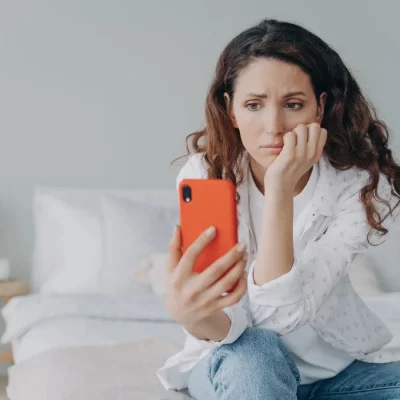Are you struggling with concentration or sleep issues? These could be more than just signs of being overwhelmed or exhausted—they may indicate an extreme anxiety disorder, which is increasingly common in today’s fast-paced world. Anxiety can manifest itself in various ways, according to the Cambridge Handbook of Anxiety and Related Disorders, Social anxiety disorder (SAD), for instance, is characterized by excessive fear of embarrassment, humiliation, or rejection in public performances or social interactions.

Recognizing symptoms and signs of extreme anxiety, often referred to as severe anxiety or panic disorder, together with the knowledge on how to overcome extreme anxiety will help you to prevent a severe imbalance in your life.
Understanding extreme anxiety involves recognizing the symptoms, identifying potential causes, and utilizing effective coping strategies. With proper treatment and support, you can manage your anxiety and lead fulfilling lives.
What is extreme anxiety?
Anxiety disorders are a group of mental health conditions characterized by excessive fear, worry, and related behavioral disturbances. These disorders are among the most common mental health issues and can significantly impact your daily functioning and quality of life. Below are the primary types of anxiety disorders, each with its own unique symptoms and characteristics.
- Generalized anxiety disorder (GAD) is characterized by chronic, excessive worry about various aspects of daily life such as work, health, or social interactions. The anxiety is often disproportionate to the actual situation and persists for at least six months.
- Panic disorder involves recurrent, unexpected panic attacks—sudden periods of intense fear that may include palpitations, sweating, shaking, shortness of breath, numbness, or a feeling of impending doom.
- Social anxiety disorder (Social phobia) involves intense fear or anxiety in social situations where one might be scrutinized or judged by others. This fear can be so severe that it interferes with daily activities.
- Specific phobias involve intense, irrational fear of a particular object, situation, or activity that is generally not harmful. Common phobias include fear of heights (acrophobia), fear of flying (aviophobia), and fear of certain animals (arachnophobia for spiders).
What are the symptoms of extreme anxiety?
Extreme anxiety manifests in both physical and psychological symptoms. Recognizing these can help in seeking appropriate treatment. Extreme anxiety physical symptoms may have a wide range, such as:
- an irregular or fast heartbeat and/or heart palpitations at night
- excessive perspiration
- trembling or shaking
- difficulty breathing or feeling suffocated
- chest pain
- dizziness
- and nausea
So if you ever asked yourself or Google: “Can extreme anxiety cause physical symptoms?”, the answer is “Yes, it can”.
Common psychological symptoms of extreme anxiety are the following:
- persistent and excessive worry about everyday situations
- a feeling that something terrible will happen
- depersonalization or feeling detached from oneself
- avoiding behavior
- and hypervigilance.
Understand the signs of extreme anxiety disorder with the Stanford Center for Health Education
What are the causes and triggers of extreme anxiety?
The causes of extreme anxiety are complex and multifaceted, often involving a combination of genetic, environmental, and psychological factors: genetics, brain chemistry, medical conditions, stress, and past traumatic events.
Among the causes of extreme anxiety, 3 groups can be defined:
- Family history and genetics
Anxiety disorders often run in families, suggesting a genetic predisposition. Similarly, specific genes have been linked to anxiety, affecting neurotransmitter functions and the brain’s response to stress.
- Psychological factors
Personality traits such as perfectionism or a tendency to worry, may be more prone to developing anxiety disorders. Past trauma can increase the risk of anxiety disorders. Traumatic events can leave lasting impacts on the brain’s stress response system.
- Environmental factors
Long-term exposure to stressful situations, such as financial difficulties, job-related stress, or relationship problems, can lead to the development of anxiety disorders. Additionally, major life changes, such as moving, starting a new job, or the loss of a loved one, can trigger extreme anxiety.
Triggers of extreme anxiety can be defined as specific situations, thoughts, or events that can provoke anxiety symptoms. Understanding these triggers can help in managing and avoiding exacerbation of your anxiety. There are situational, emotional, physical, environmental, and health-related triggers. Each case of extreme anxiety should be approached individually to determine the trigger(s) and build the coping strategy most effectively.
How does extreme anxiety impact your daily life?
Extreme anxiety, characterized by persistent and overwhelming worry and fear, can significantly impair your daily functioning. The impact is multifaceted, affecting physical health, mental health, social interactions, and overall quality of your life.
- Effects of anxiety on the body can be characterized by chronic fatigue syndrome, sleep disturbances, muscle tension and pain, gastrointestinal issues, and increased risk of illness.
- Physical health and mental health are closely connected. Persistent worry, concentration difficulties, memory problems, decision-making difficulties.
- Emotional impact is usually expressed in mood swings, low self-esteem, and depression.
- Social interactions can also be affected by anxiety. Social withdrawal, impaired communication, strained relationships, and avoidance behavior are on the list of extreme anxiety symptoms.
- Professional life may suffer from decreased performance, fear of failure, and procrastination, leading to missed deadlines and increased stress.
- Daily activities can indicate routine disruption, making simple tasks like grocery shopping, driving, or attending appointments overwhelming, provoking health neglect and dependency on others for support and reassurance, affecting your independence and self-confidence.
How to cope with extreme anxiety and what are the treatments?
Managing extreme anxiety often requires a combination of strategies, including lifestyle changes, online therapy, and sometimes medication.
- Lifestyle changes such as increased physical activity, healthy diet, proper sleep hygiene, and practices that promote relaxation and mindfulness will be a great first step on your way back to balance.
- Online therapy allows several approaches to manage extreme anxiety.
- Cognitive behavioral therapy (CBT) focuses on identifying and changing negative thought patterns and behaviors;
- Exposure therapy provides gradual exposure to anxiety-triggering situations to desensitize and reduce fear;
- Acceptance and commitment therapy (ACT) encourages accepting negative thoughts and feelings rather than fighting them.
- Medication to treat extreme anxiety may be also recommended by your therapist. Here is what you can expect: antidepressants help balance brain activity, benzodiazepines provide fast-acting relief for acute anxiety symptoms, and beta-blockers can help manage physical symptoms of anxiety.
- The National Institute of Health emphasizes the connection between physical activity and mental health, so even before you start your online therapy, consider increasing your physical activity.
When do I seek professional help for extreme anxiety?
If you or someone you know is experiencing extreme anxiety and/or showing symptoms, it’s crucial to seek professional help. A Makin Wellness professional can offer a personalized treatment plan tailored to your individual needs.
According to 2021 clinical research, anxiety disorders are most effectively treated with evidence-based psychotherapy and psychoactive medications.
If you recognize yourself or someone you know, you may want to consult our specialists. At Makin Wellness we provide high-quality online therapy services. Call us at (833)-274-heal or start here to schedule an appointment with a specialized counselor who understands your unique needs. Your mental health journey begins now.
More about this topic:
The Future Of Anxiety Therapy: Online Therapy In Pennsylvania











